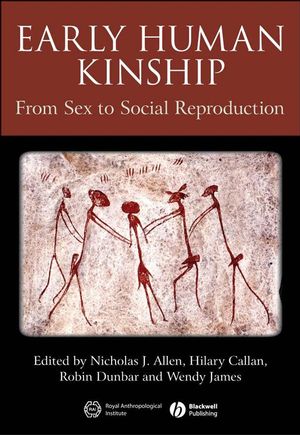Early Human Kinship: From Sex to Social ReproductionISBN: 978-1-4051-7901-0
Hardcover
336 pages
June 2008, Wiley-Blackwell
 Other Available Formats: Paperback
|
||||||
Stanley Ulijaszek, University of Oxford
"An international collection of leading figures in paleontology,
linguistics, geography and anthropology consider the transition
from the biological kinship of primates to social kinship of modern
humans which also marks the transition to language and the social
control of the environment."
R.H. Barnes, University of Oxford
"For too long, studies of the cultural and the genetic aspects
of kinship have proceeded in isolation from one another. This
volume marks the beginning of what promises to be a fruitful
conversation between evolutionary biology and social
anthropology."
Daniel Nettle, Newcastle University
"Early Human Kinship brings together exciting new
perspectives from a range of human sciences. Useful for teaching,
it will also encourage further cross-disciplinary research into the
origins of human kinship, and therefore of humanity itself."
Robert Parkin, University of Oxford
"This important book puts the study of kinship back in the
center of deep history-exactly where nineteenth century
anthropology first found it. Welcome back!"
Thomas Trautmann, University of Michigan
"In the middle of last century, Lévi-Strauss advanced that
our ancestors came out of their animal state as the result of two
“big bangs”. Symbolic thinking and language, he
claimed, suddenly appeared, and humans were then able to leave off
bedding their sisters or their daughters, and instead exchange them
for other men’s daughters. Thus the incest taboo and male
domination were sufficient to promote our ancestors from a state of
nature to one of culture. Today the authors of Early Human Kinship
show that these “big bangs” never happened and that the
ancestors of modern humans shook off their original animal state
through a series of transformations that began with the appearance
of Homo erectus and the domestication of fire (500,000 BP). It was
above all the development of our ancestors’ cognitive
capacities that enabled them to imagine and gradually to put into
practice various social forms of sexual intercourse and to decide
that the children born of these unions belonged to a given group of
adults considered to be their kin. Kinship relations have always
formed systems, but they have never been the only founding
principle of any society."
Maurice Godelier, École des Hautes Études en
Sciences Sociales



